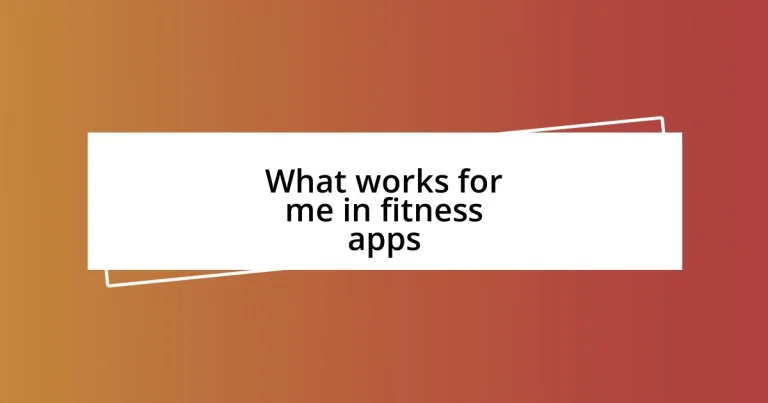Key takeaways:
- Fitness apps enhance workouts through progress tracking, personalized plans, and community support, making the fitness journey more motivating and engaging.
- Choosing the right app involves considering goal alignment, user interface, community support, tracking capabilities, and cost versus value.
- Setting realistic goals using the SMART criteria and celebrating small victories are crucial for maintaining motivation and achieving long-term fitness success.
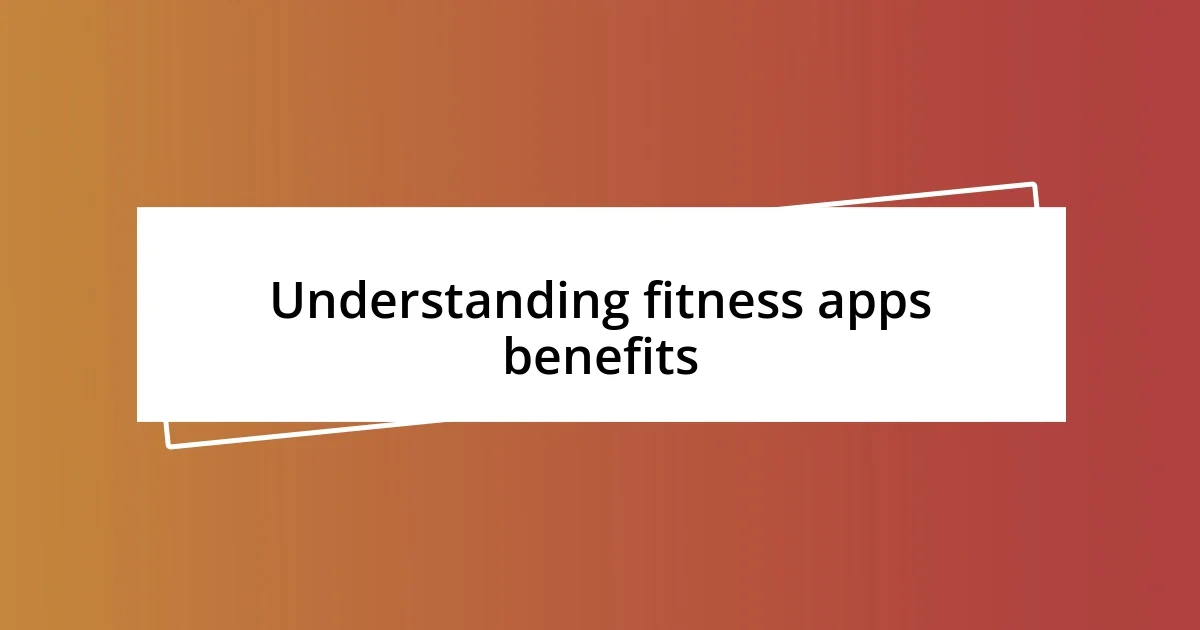
Understanding fitness apps benefits
Fitness apps offer a wealth of benefits, and I often find myself marveling at how they transform my workouts. One feature that truly stands out is the ability to track my progress over time. It’s incredibly motivating to see my improvements laid out visually; it feels like a personal achievement, reinforcing my commitment to fitness.
Another remarkable aspect is the accessibility of information. I remember when I started my fitness journey, the plethora of workout plans and nutritional guides in these apps felt overwhelming yet exhilarating. It’s like having a personal trainer and nutritionist right at my fingertips! This vast resource ensures that I can adjust my routine according to my goals, which is so empowering.
Do you ever feel lost on how to maintain a consistent fitness routine? What I appreciate most is the community and support these apps foster. For me, joining challenges and sharing my journey with like-minded individuals helped me stay accountable. Engaging with others creates a sense of belonging, reminding me that I’m not alone in striving for a healthier lifestyle.
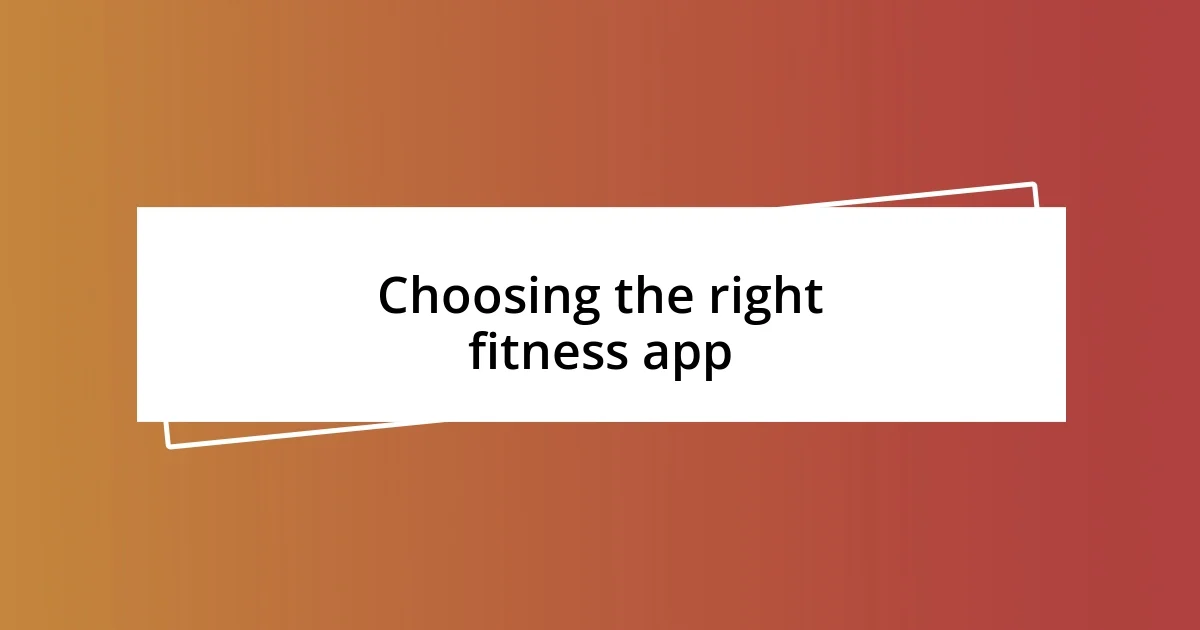
Choosing the right fitness app
When it comes to choosing the right fitness app, it’s essential to consider your personal fitness goals. For instance, when I first looked into fitness apps, I focused on weight loss, which led me to apps centered around calorie counting and HIIT workouts. As my goals evolved, I appreciated platforms that offered a variety of programs, so I wouldn’t get bored and could challenge myself in new ways.
Here are some factors to keep in mind:
- Goal Alignment: Make sure the app’s features align with your specific fitness objectives.
- User Interface: A user-friendly interface can make all the difference; I love apps that are easy to navigate.
- Community Support: Look for apps that provide access to groups or forums, as this can motivate you.
- Tracking Capabilities: Choose an app that offers comprehensive tracking of workouts, nutrition, and progress—this really keeps me engaged.
- Cost vs. Value: Consider whether the app’s free features meet your needs or if premium options genuinely provide additional value.
Finding the right fit can be a journey in itself, but trust me when I say that a well-chosen fitness app can turn your routines from mundane to exhilarating. The last app I tried had an incredible selection of classes that felt fresh every week, keeping my motivation high.

Key features in fitness apps
When examining key features in fitness apps, I can’t overstate the importance of personalized workout plans. Earlier in my fitness journey, I started with generic exercises, but as soon as I discovered apps that tailored workouts to my experience level and goals, everything shifted. It was like having a fitness coach who understood my unique needs, and the customized approach made my workouts not only more effective but also far more enjoyable.
Another standout feature is the nutrition tracking capability. After a few months of using a fitness app with a comprehensive food diary, I learned how essential my diet was to achieving my fitness goals. Tracking my meals helped me identify where I could improve, and, honestly, I was surprised at how small changes in my eating habits led to significant results. It felt empowering to regain control over my nutrition and witness the impact it had on my fitness journey.
Finally, let’s talk about integration with wearables. I remember the thrill of connecting my fitness app to my smartwatch. The real-time data added a whole new dimension to my workouts. I could monitor my heart rate and calories burned on the go, allowing me to push my limits safely. Having this instant feedback kept my workouts dynamic and engaging, encouraging me to keep striving for those little victories.
| Feature | Description |
|---|---|
| Personalized Workout Plans | Custom routines based on individual goals and fitness levels. |
| Nutrition Tracking | Food diary to monitor dietary intake and nutritional balance. |
| Integration with Wearables | Syncs with devices to enhance tracking of workouts and health metrics. |
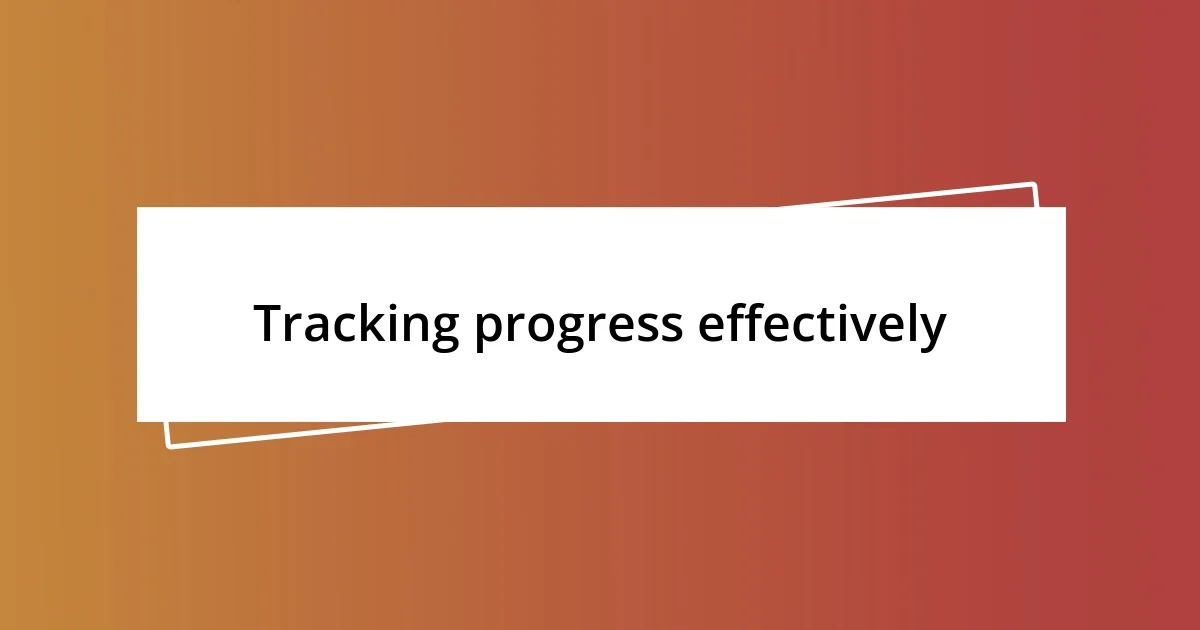
Tracking progress effectively
Tracking progress is where the magic happens. I remember the first time I took a step back to analyze my fitness stats—seeing my performance graphs and milestones felt like I was unveiling a new layer of motivation. It’s not just about working out; it’s about celebrating the journey through measurable goals. Have you ever looked at your progress and thought, “Wow, I really have come a long way”? That feeling is priceless.
Using an app that tracks workouts and nutrition has transformed my approach. I can easily log each session, monitor my lifting weights, and even track my heart rate over time. One feature I particularly love is the visual progress charts. They’re like trophies for my efforts, proving that consistency pays off. When I hit a new personal best, it’s almost like having a friend cheer me on from my phone.
Additionally, understanding my patterns has been a game changer. I’ve noticed I tend to skip workouts on Tuesdays, and now I’ve made it my mission to turn that around. By recognizing these trends through my app, I can adjust and keep myself accountable. It’s fascinating how just having that data can shine a light on habits I wasn’t even aware of. Have any of you made similar discoveries from tracking your workouts? It’s amazing how self-awareness can drive change!
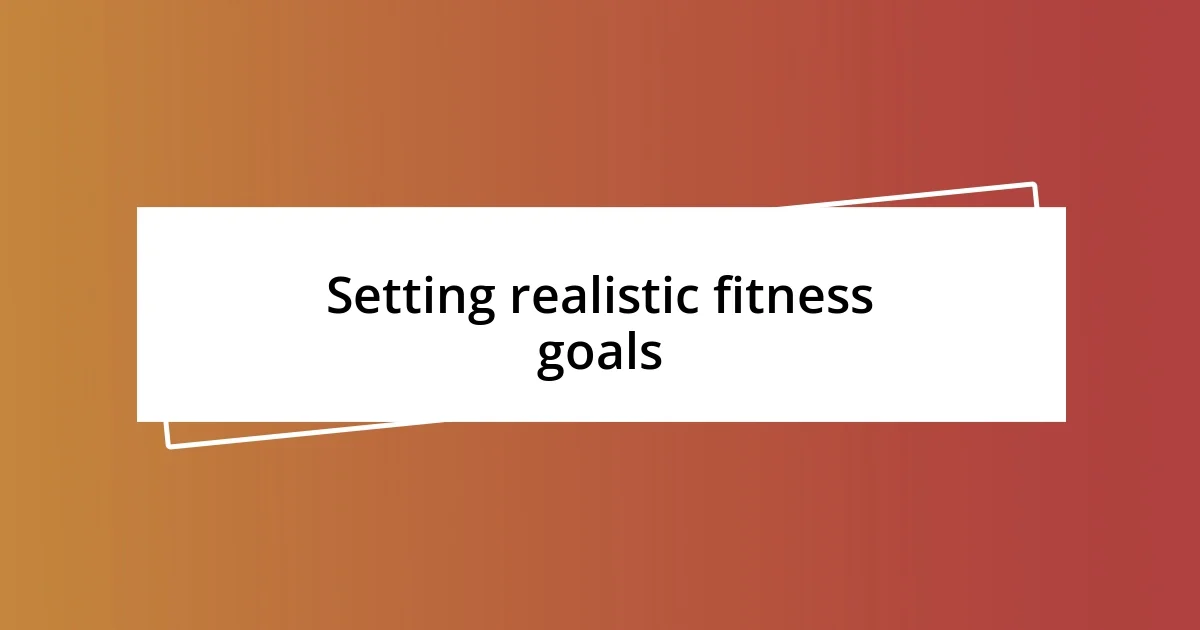
Setting realistic fitness goals
Setting realistic fitness goals is essential for long-term success. In my experience, it’s all too easy to aim for lofty targets—like wanting to lose 20 pounds in a month—only to feel discouraged when reality sets in. I remember my own struggles with goal-setting; it wasn’t until I broke my goals into smaller, manageable milestones that I finally found my stride.
One effective strategy I’ve used is the SMART criteria—Specific, Measurable, Achievable, Relevant, and Time-bound. For instance, instead of simply saying, “I want to get fit,” I set a goal to run a 5K in three months, with a plan to increase my running distance weekly. This clarity provided a roadmap that kept me focused and motivated. Have you ever tried this approach? It can really change the game.
I also learned to celebrate small victories along the way. When I finally ran that first mile without stopping, the feeling was exhilarating! By acknowledging these smaller achievements, I built a positive loop of encouragement that propelled me forward. So, the next time you set a goal, ask yourself: “What steps can I take today to make my dream a reality?” You might be surprised at how much progress you can make by simply rethinking your approach.
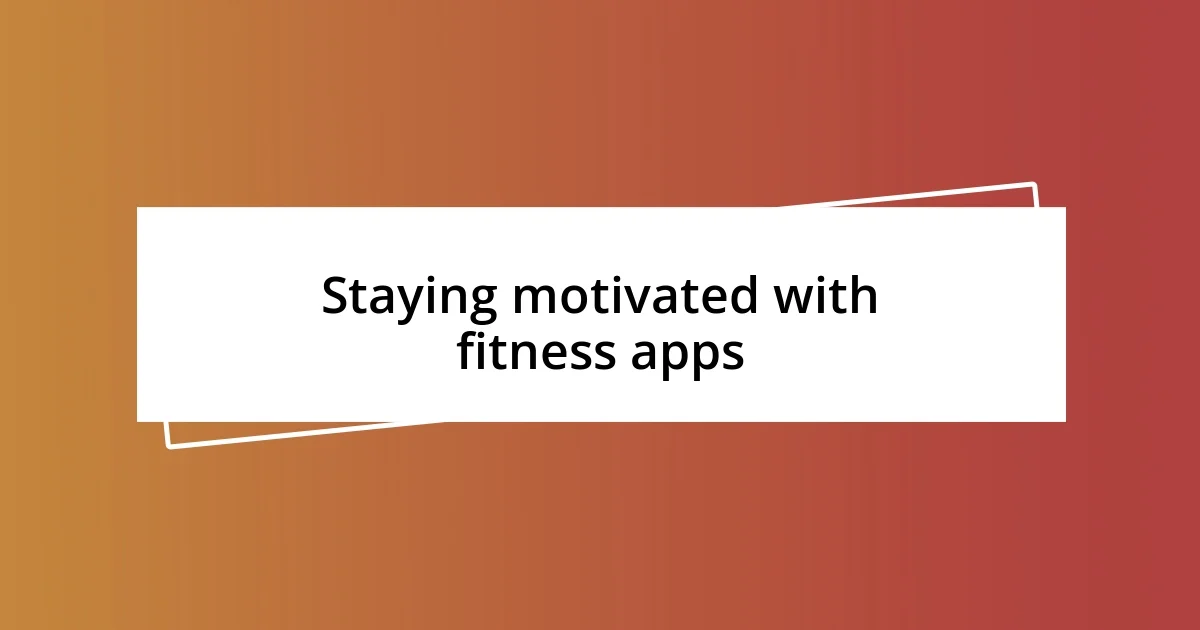
Staying motivated with fitness apps
Staying motivated with fitness apps can feel like having a personal cheerleader in your pocket. I still recall the day I completed my first month on a new app. The congratulatory message it sent me made me smile and pushed me to keep going. It’s those little digital nudges that remind us we’re making progress, isn’t it? When an app recognizes my dedication, it reinforces my commitment and fuels my desire to hit the gym.
Gamification elements in fitness apps have genuinely changed the way I approach my workouts. I remember when I unlocked my first badge; it felt like an accomplishment worth celebrating! Competing against friends or even myself in challenges adds a fun twist and makes my sessions far less monotonous. Have you ever felt that rush of joy when you beat a personal record? That doesn’t just motivate me; it keeps me excited for what’s next.
Moreover, I find that setting daily reminders through these apps is a game changer. Last week, I received a notification just when I was feeling unmotivated. I took a deep breath and hit the gym anyway. In retrospect, that simple reminder was pivotal in keeping my momentum alive. What about you? Do you use reminders to keep your fitness journey on track? It’s amazing how a little nudge can lead to unexpected breakthroughs!
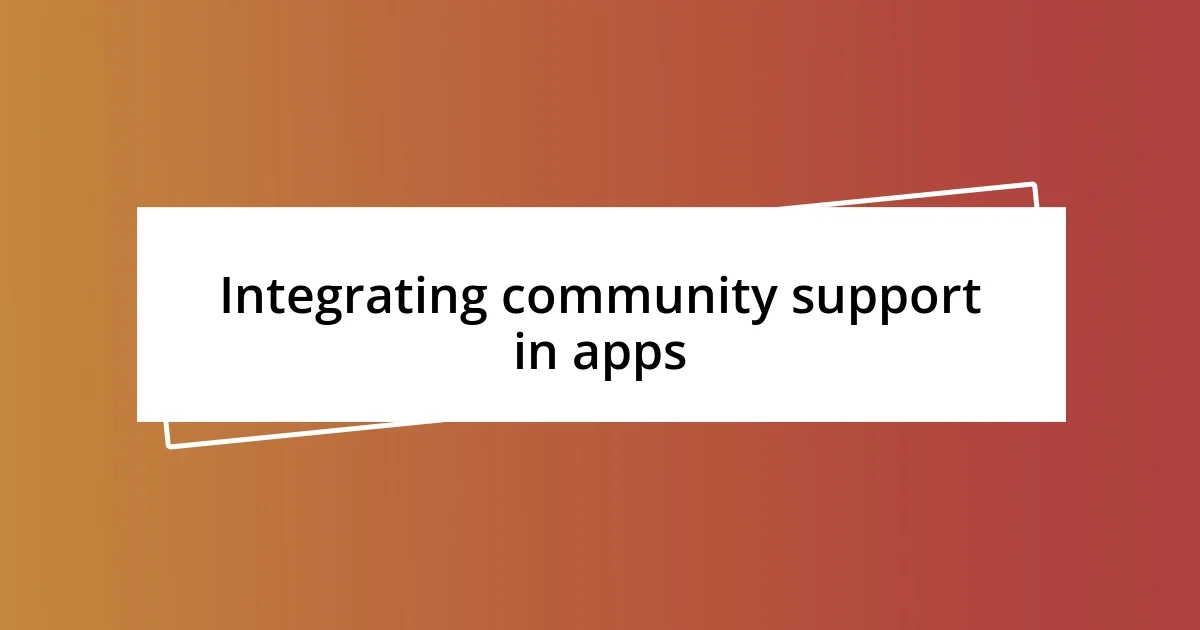
Integrating community support in apps
Integrating community support in fitness apps can be a transformative experience. I still remember joining a virtual running group through an app; it felt like I’d found my tribe. Seeing others post their running achievements motivated me to lace up my shoes even on days I felt uninspired. Isn’t it incredible how a little camaraderie can make a world of difference in our fitness journey?
When the community engages in challenges together, it not only builds accountability but also fosters friendships that extend beyond the app. There was a time when I participated in a month-long fitness challenge, and the group chats were buzzing with encouragement. I genuinely felt that if others could tackle their workouts, I could too. Have you ever felt the rush of support that pushes you to go the extra mile?
The emotional highs and lows we all encounter in fitness become less daunting when shared with a community. I often find solace in reading others’ stories—like that one friend who struggled with the same workout I was dreading. It reassured me that I wasn’t alone in my journey. When someone shares their struggles and triumphs, it creates a safe space where vulnerability meets strength. How often do we need that kind of connection in today’s world?












